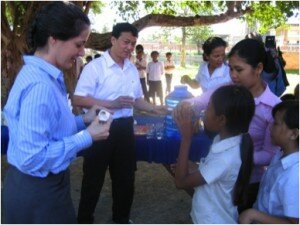Reposted with permission from the ONE Campaign’s blog
Kim Koporc from Children Without Worms (CWW) writes about an illness that affects children all over the world, including Africa: intestinal worms.

Photo Credit: Children without Worms
When I visited Cambodia with Johnson & Johnson for a deworming day at Poek Ho (waterfall) school in Kandal Province, I was struck by the sheer number of students who lined up to receive mebendazole. These children showed up to receive treatment for intestinal parasites with mebendazole donated by Johnson & Johnson. They also received a meal, which for some was likely the only meal they received that day.

Photo Credit: Children without Worms
These children were at particular risk of infection with intestinal worms because worms thrive in the warm climate. The lack of access to sanitation facilities in Cambodia doesn’t help much, either. In America, it is hard for us to imagine that more than 1.2 billion people living in developing countries are infected with intestinal worms. Worms are most prevalent in children between the ages of 6 to 14 and can lead to malnutrition, robbing them of the energy they need to learn and grow.
Schools provide CWW and our partners with a means to distribute the mebendazole to the children who need it, and schools also provide a platform to teach STH prevention by promoting healthy behavior within the classroom. Helen Keller International, our partners in Cambodia, works to integrate deworming prevention and hygiene into school programs and curriculum.

Photo Credit: Children without Worms
Even though schools provide a platform for reaching children in Cambodia, many of the poorest children do not have the resources and ability to attend school, and therefore, are left out of these deworming days. Strategies need to be developed to target this vulnerable population, such as inviting non-enrolled children to attend on “deworming day” and working with community leaders to identify and treat these children.
Treatment, hygiene education and access to sanitation and clean water are all components needed to bring STH infection under control, and together, governments, NGOs and other groups can come up with better solutions to reach this vulnerable population and find ways to prevent and treat intestinal worms.
There are many health challenges that children face throughout the world. But for intestinal worms, there is a solution that greatly improves a child’s capacity to learn and grow. A dose of medication, along with hygiene education and access to sanitation, are vital steps forward in improving a child’s life.
Read more about CWW’s work to distribute mebendazole from Johnson & Johnson to school age children as part of the Cambodia’s national deworming program.
